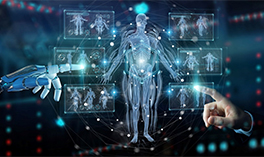
Although, the healthcare professionals have been implementing AI in their jobs, you cannot and should not get your diagnosis done from any AI tool.
In the fast-pacing world of healthcare, artificial intelligence (AI) stands as an enabler more than a change agent, especially in the diagnostic areas. AI-powered diagnostics is revolutionizing how we look at disease detection+ diagnosis and treatment planning, perfectly complementing the healthcare systems worldwide; making it precise and more efficient by n-folds. The blog post explores the possibilities and consequences of AI-powered diagnostics and highlights how this technology is changing the future of medicine.
The Rise of AI in Healthcare
While the idea of AI for healthcare in itself is not new, recent developments in machine learning (ML), data driven decision and computational power have brought its application to a new level. Artificial Intelligence algorithms, which emulate human responses, can sort through enormous quantities of medical data such as images, test results and patient histories faster and with far greater accuracy than doctors for example. This is especially valuable in diagnostics - an area where the timely, and definitive diagnosis of disease (diagnosis) is the cornerstone of effective patient care.
Enhancing Diagnostic Accuracy
Overzealous and waning - two faces of AI in diagnostics. Diagnostic potential has been a major benefit of AI-powered diagnostics. Additionally, conventional diagnostic approaches are frequently dependent on human interpretation which is inherently subject to variability and error. Data When it comes to data, AI can handle and understand consistent medical data through algorithms which means that misdiagnosis is less probable with diagnostic tools. In radiology, AI algorithms can scrutinize medical images - X-rays, CT scans and MRIs - for evidence of disease not only more carefully than the human eye but also with a level of precision that typifies many human-reading radiologists
This is illustrated, for example, by the implementation of AI in screening for breast cancer. By specializing in the cause, AI algorithms have proven to detect malignant cancer cells, for example in mammography, better than a radiologist can and thus ensure more extensive and precise diagnostic work at an early stage. Not only does this enhance patient results but it also decreases the workload between healthcare professionals allowing them to place their efforts into other intricate cases.
Speed and Efficiency
Speed and Efficiency on the Diagnostic Front - Whether used to validate test results or itself as a diagnostic tool, AI is able to perform its role accurately at lightning speeds. AI can sort through massive datasets more rapidly than a human expert can, so it leads to faster diagnostic results. This is especially crucial in emergency cases when a timely diagnosis can be a matter of life or death.